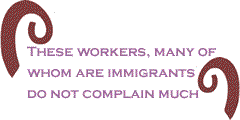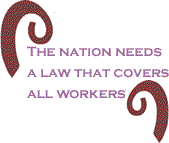 With
the stroke of his pen, New York Governor David Patterson
signed into law the Wage Theft Prevention Act (WTPA) this
week, greatly increasing the penalties for withholding pay
or other compensation from workers. With
the stroke of his pen, New York Governor David Patterson
signed into law the Wage Theft Prevention Act (WTPA) this
week, greatly increasing the penalties for withholding pay
or other compensation from workers.
This
piece of legislation came with the usual opposition from
some of the most powerful forces in the U.S. For example, on Dec.
6, 2010, the Manhattan Chamber of Commerce, in a letter
to Patterson�s counsel, Peter Kiernan, warned that the bill
would �affect over 250,000 businesses in New
York City and compound the difficulty of doing business�by
creating an additional unnecessary and burdensome paperwork
and penalty regime.�
But,
what the local Chamber of Commerce - and certainly its big
brother, the U.S. Chamber of Commerce - never mention is
the amount of money that is stolen from workers across the
country, every day, year after year.
In
New York City alone, it is estimated
that, if the law is effective, workers will have about $956
million more to spend in New York City every year. For many of the thousands of workers, that
money will make the difference between living on the edge
and being able to put food on the table and maybe taking
a family member to the doctor.
Across
the country, if the same numbers held, that would be untold
billions of dollars in the pockets of workers and, of course,
most of that money would go to the businesses in local communities.
But, there is not such a federal law aimed at preventing
such crimes.
In
New York, before the signing of the WTPA, the laws protecting
workers from depredations by unscrupulous employers existed,
but the penalties were weak, at best, and for the most part,
there was little concern about any penalty on the part of
most employers, because any penalty might consist of paying
the worker back wages. Even then, if there were few or sloppy
records, the settlement might not amount to the full back
pay owed the worker.

Failure
by government agencies - in this case the labor departments
of the various states and the federal government - to act
on behalf of the workers cheated out of their just wages
appears to be, first, because of the lack of sufficient
staff to investigate complaints. Secondly, the workers most
likely to be cheated out of their wages and other compensation
are among the lowest paid.
These
workers, many of whom are immigrants - legal and undocumented
- do not complain much. Mainly, they fear losing their jobs
and, even more importantly, they fear that a complaint might
bring an investigation into their immigration status. Even
those in the country with proper papers do not want to start
that kind of government action.
It
is a system ready-made for abuse of the workers, and it
is very easy for an employer, looking for a little more
profit in the bottom line, to extract it from the people
with little or no power, the low-wage workers.
If
workers don�t speak for themselves, who will speak for them?
In the past, it has been the trade unions that have spoken
up in behalf of the workers, but the powers-that-be have
been working overtime to stamp out the unions. And, if they
couldn�t actually stamp them out, they would work to eliminate
their effectiveness. They have done that by a massive propaganda
effort - conducted by Corporate America over many decades
and, even, by large numbers of elected officials in state
and federal governments over several decades.
 Now,
though the unions have supported non-union workers in their
efforts to achieve some justice in the workplace, the main
thrust of support for the WTPA has come from worker support
groups, such as Interfaith Worker Justice. But even those
groups that are based in the faith communities have come
under attack, and that has an effect on the people, even
the low-wage workers who will benefit from the WTPA. Now,
though the unions have supported non-union workers in their
efforts to achieve some justice in the workplace, the main
thrust of support for the WTPA has come from worker support
groups, such as Interfaith Worker Justice. But even those
groups that are based in the faith communities have come
under attack, and that has an effect on the people, even
the low-wage workers who will benefit from the WTPA.
A
popular commentator (practically a Republican spokesman)
on the Fox Network said earlier this year that, if your
church mentions the words �social justice,� you should get
up and walk out immediately. He bases his hysterical fear
of social justice on his fear of �socialism,� or worse,
Marxism or communism. Of course, social justice is exactly
what the WTPA achieves, at least in a small measure. But
when a movement is faced with the power of a television
network that spends hours each day crusading against any
effort to gain a measure of equity for workers, it raises
the fight to another level.
The
fears of such people, however, is that somehow the balance
of power will be changed and that the obscenely rich will
not be able to hold onto their riches. To a small degree,
this is a valid fear. But, if America is to be brought back from the brink of
economic collapse (which many fear is already upon us),
the masses of people have to share in some small way in
the wealth of the nation.
Certainly,
the Wage Theft Protection Act is a step in that direction,
but it is only a small step - it only seeks to make right
what has been wrong for so long. And, it only provides for
workers in New
York. There are a few other states with such laws, but the
nation needs a law that covers all workers.
 To
make it worth the governor�s signature, however, the new
law needs to be enforced. And that�s the hard part. So the
question remains, how many new wage inspectors does the
Department of Labor plan to hire to enforce a law that promises
so much, but, without the backing of the force of law, will
not be much more than an expression of good intentions? To
make it worth the governor�s signature, however, the new
law needs to be enforced. And that�s the hard part. So the
question remains, how many new wage inspectors does the
Department of Labor plan to hire to enforce a law that promises
so much, but, without the backing of the force of law, will
not be much more than an expression of good intentions?
It
remains to the workers themselves and their supporters in
organized labor and other social justice groups to demand
enforcement of the new law, so that these most vulnerable
will be able to conduct their lives with some dignity, knowing
they are supported by their fellow workers.
BlackCommentator.com
Editorial Board member Carl Bloice is a writer in San Francisco, a member of the National Coordinating Committee of
the Committees of Correspondence for Democracy and Socialism
and formerly worked for a healthcare union. Click here
to contact Mr. Bloice.

|

